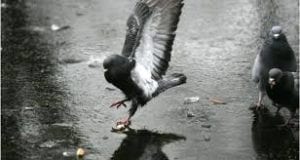
by Pigeon Patrol | Feb 26, 2020 | 4-S Gel Bird repellent, Animal Deterrent Products, Bird Deterrent Products, Bird Netting, Bird Spike, Bird Spikes, Pigeon Control, Pigeon Droppings, Pigeon Patrol's Services, Pigeon Spikes, Pigeons in the News, UltraSonic Bird Control
How Did the Pigeon Get to NYC? One can scarcely think of any park in NYC — or any city, really — without envisioning the ubiquitous pigeon there as well. Despite signs requesting you not feed the birds in adjacent Bryant Park, the library has more than its share of feathered patrons.
But how did this non-native species become the bird most associated with New York City? Pigeons are certainly not indigenous, but they have made themselves quite at home in the Big Apple. In Wild New York: A Guide to the Wildlife, Wild Places, & Natural Phenomena of New York City, authors Margaret Mittelbach and Michael Crewdson explain “Also called rock doves, pigeons were first brought to this country from Europe, probably during the 1600s, and that their original status here was that of a barnyard animal, raised purely for the table.”
Captive pigeons somehow struck out on their own, nesting easily in the crevices of buildings that are not that different than the cliff sides on which their ancestors dwelled. Over time, pigeons and their young squab dwindle from menus and dinner tables. Ironically, most city pigeons depend exclusively on humans to feed them, whether purposefully or accidentally through litter.
to feed them, whether purposefully or accidentally through litter.
Thousands of years ago in North Africa, people built dovecotes to house and raise pigeons for food and to use their droppings as fertilizers. New Yorkers have kept a similar relationship with pigeons by building coops on building rooftops and raising pigeons for racing and companionship. Bert on Sesame Street famously loves pigeons, enough to sing about it. Scientist Nikola Tesla was extremely fond of pigeons and would frequent NYC parks searching for injured birds, which he would then bring back to his residence at the Hotel New Yorker to nurse them back to health. His obsession with pigeons is documented in the novel The Invention of Everything Else and he had a favorite pigeon, which he mourned when she died.
The New York Times has covered pigeons in abundance and there are many non-fiction titles out there to help you learn more about these birds such as Pigeons: The Fascinating Saga of the World’s Most Revered and Reviled Bird by Andrew D. Blechman. There are pigeon appreciation groups and documentaries by local filmmakers, such as JL Aronson’s Up on the Roof. Pigeons are definitely part of New York’s wildlife and landscape.
Source
At Pigeon Patrol, we manufacture and offer a variety of bird deterrents, ranging from Ultra-flex Bird Spikes with UV protection, Bird Netting, 4-S Gel and the best Ultrasonic and audible sound devices on the market today.
Contact us at 1- 877– 4– NO-BIRD, (604) 585-9279 or visit our website at www.pigeonpatrol.ca
Bird Gone, Pigeon Gone, Seagull Gone, Pigeon issue, pigeon spikes, 1-877-4NO-BIRD, 4-S Gel, Bird Control, Pigeon Control, bird repellent, Bird Spikes, sonic bird repellent, stainless steel bird spikes, bird spikes Vancouver, Ultra Sonic Bird Control, Bird Netting, Plastic Bird Spikes, Canada bird spike deterrents, Pigeon Pests, B Gone Pigeon, Pigeon Patrol, pest controller, pest control operator, pest control technician, Pigeon Control Products, humane pigeon spikes, pigeon deterrents, pigeon traps, Pigeon repellents, Sound & Laser Deterrents, wildlife control, raccoon, skunk, squirrel deterrent, De-Fence Spikes, Dragons Den, Canada bird spikes, Canada pigeon, pigeon control, pigeon patrol, pigeon. Kill pigeons, crow, starling
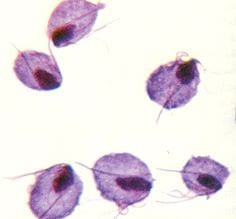
by Pigeon Patrol | Feb 26, 2020 | 4-S Gel Bird repellent, Animal Deterrent Products, Bird Deterrent Products, Bird Netting, Bird Spike, Bird Spikes, Pigeon Control, Pigeon Droppings, Pigeon Patrol's Services, Pigeon Spikes, Pigeons in the News, UltraSonic Bird Control
Trichomoniasis: Finding Sick, dying or dead pigeons?
Hello Everyone
We have been getting an increasing number of
Trichomoniasis related calls at this time of year. Every year outbreaks are seen during the late summer and autumn. This disease does not pose a threat to the health of humans, cats or dogs.

Greenfinches are reported most frequently, but potentially any bird can be infected, including pigeons and doves and some birds of prey. The trichomonad parasite lives in the upper digestive tract of the bird, and its actions progressively block the bird’s throat making it unable to swallow food, thus killing it by starvation.
The infection is spread as pigeons feed one another with regurgitated food during the breeding season, and through food and drinking water contaminated with regurgitated saliva. Saliva can also contaminate a birdbath. Trichomoniasis cannot live long outside a hosted pigeons.
Trichomoniasis causes lesions in the throat of the infected pigeons, which makes it progressively harder for the bird to swallow its food, and eventually breathe. Birds will also show signs of lethargy and fluffed up plumage, drooling saliva and regurgitated food. Affected birds frequently have matted wet plumage around the face and beak and uneaten food in and around the beak.
If a number of birds show symptoms, we recommend to stop putting out all food and leave bird baths dry for at least three weeks. This helps to disperse the feeding birds and reduce the contact between sick and healthy individuals, thus slowing down the outbreak. The higher the concentration of birds at a feeding station, the greater the chance of another bird picking up an infected food particle and exposing itself to the infection.
There are also a few other actions you can take to help:
Use feeders with drainage holes to avoid moisture building up
– Use more than one feeding site to reduce the number of birds in one place
– Rotate feeders around several locations to ‘rest’ each spot to prevent build up of infection on the ground underneath.
– Clean and disinfect feeders and water baths regularly, rinsing thoroughly and allowing to air dry completely – this itself will kill some diseases
– Keep the bucket and brush you clean feeders with outside and using just for this purpose
– Sweep up droppings and spilt or old food and disposing of it carefully in an outside bin
– Change the water in baths frequently – ideally daily
– Wash your hands carefully afterwards
No effective treatment can be administered to birds in the wild, because it is impossible to ensure that the infected individuals receive an adequate dose and that healthy birds do not pick up the medicine.
At Pigeon Patrol, we manufacture and offer a variety of bird deterrents, ranging from Ultra-flex Bird Spikes with UV protection, Bird Netting, 4-S Gel and the best Ultrasonic and audible sound devices on the market today.
Contact us at 1- 877– 4– NO-BIRD, (604) 585-9279 or visit our website at www.pigeonpatrol.ca
Bird Gone, Pigeon Gone, Seagull Gone, Pigeon issue, pigeon spikes, 1-877-4NO-BIRD, 4-S Gel, Bird Control, Pigeon Control, bird repellent, Bird Spikes, sonic bird repellent, stainless steel bird spikes, bird spikes Vancouver, Ultra Sonic Bird Control, Bird Netting, Plastic Bird Spikes, Canada bird spike deterrents, Pigeon Pests, B Gone Pigeon, Pigeon Patrol, pest controller, pest control operator, pest control technician, Pigeon Control Products, humane pigeon spikes, pigeon deterrents, pigeon traps, Pigeon repellents, Sound & Laser Deterrents, wildlife control, raccoon, skunk, squirrel deterrent, De-Fence Spikes, Dragons Den, Canada bird spikes, Canada pigeon, pigeon control, pigeon patrol, pigeon. Kill pigeons, crow, starling
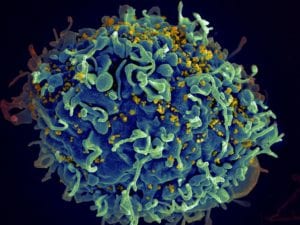
by Pigeon Patrol | Feb 26, 2020 | 4-S Gel Bird repellent, Animal Deterrent Products, Bird Deterrent Products, Bird Netting, Bird Spike, Bird Spikes, Pigeon Control, Pigeon Droppings, Pigeon Patrol's Services, Pigeon Spikes, Pigeons in the News, UltraSonic Bird Control
Did The Common Pigeon Bring An AIDS-Defining Fungus To Asia?
New research has shed light on the origins of a fungal infection which is one of the major causes of death from AIDS-related illnesses that pigeon may bring.
AsianScientist (May 4, 2011) – New research has shed light on the origins of a fungal infection which is one of the major causes of death from AIDS-related illnesses. The study, published yesterday in the journal PLoS Pathogens, shows how the more virulent forms of Cryptococcus neoformans evolved and spread out of Africa and into Asia. C. neoformans is a highly pathogenic fungi which causes life-threatening infections in immunocompromised humans.
The fungus mainly lives in decaying pigeon or chicken droppings and enters the human host through the respiratory tract. The spores spread to extrapulmonary tissues and the central nervous system where it causes meningitis. A particularly virulent form, C. neoformans variety grubii (Cng), is a major cause of death among HIV-AIDS infected patients.
Up to 1 million cases of cryptococcal meningitis that result in over 600,000 deaths are reported each year. Cryptococcal meningitis affects nearly 20 percent of HIV-AIDS patients in Thailand, where HIV-AIDS is an emerging epidemic.
Researchers from the U.K., Netherlands, and Naresuan University in Thailand took 183 clinical samples in Thailand and compared them with the global database of 77 isolates. Genetic sequencing revealed that the Thailand samples taken from 11 provinces were highly homogenous. In comparison with the rest of the world’s population of Cng, specifically Africa where most of the lineages are found, the strains in Thailand had significantly less genetic diversity.
Analyses on the origin of Thailand’s strain dated it back to an ancestral African population diverging within the last 7,000 years. The common pigeon, domesticated 5,000 years ago, is thought to have spread the pathogen through its excrements when it was introduced to Europe. Subsequent voyages from Europe to Asia 500 years ago may have allowed Cng to broaden its ecological range.
The article can be found at: Simwami SP et al. (2011) Low Diversity Cryptococcus neoformans Variety grubii Multilocus Sequence Types from Thailand Are Consistent with an Ancestral African Origin. ——
Source: Biotechnology and Biological Sciences Research Council.
At Pigeon Patrol, we manufacture and offer a variety of bird deterrents, ranging from Ultra-flex Bird Spikes with UV protection, Bird Netting, 4-S Gel and the best Ultrasonic and audible sound devices on the market today.
Contact us at 1- 877– 4– NO-BIRD, (604) 585-9279 or visit our website at www.pigeonpatrol.ca
Bird Gone, Pigeon Gone, Seagull Gone, Pigeon issue, pigeon spikes, 1-877-4NO-BIRD, 4-S Gel, Bird Control, Pigeon Control, bird repellent, Bird Spikes, sonic bird repellent, stainless steel bird spikes, bird spikes Vancouver, Ultra Sonic Bird Control, Bird Netting, Plastic Bird Spikes, Canada bird spike deterrents, Pigeon Pests, B Gone Pigeon, Pigeon Patrol, pest controller, pest control operator, pest control technician, Pigeon Control Products, humane pigeon spikes, pigeon deterrents, pigeon traps, Pigeon repellents, Sound & Laser Deterrents, wildlife control, raccoon, skunk, squirrel deterrent, De-Fence Spikes, Dragons Den, Canada bird spikes, Canada pigeon, pigeon control, pigeon patrol, pigeon. Kill pigeons, crow, starling
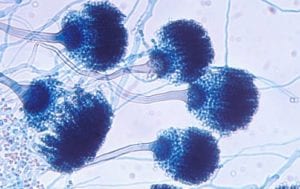
by Pigeon Patrol | Feb 26, 2020 | 4-S Gel Bird repellent, Animal Deterrent Products, Bird Deterrent Products, Bird Netting, Bird Spike, Bird Spikes, Pigeon Control, Pigeon Droppings, Pigeon Patrol's Services, Pigeon Spikes, Pigeons in the News, UltraSonic Bird Control
A new virus has been isolated from the tissues of pigeons with visceral lesions that were characterized by focal necrosis of parenchymatous tissue, by the presence in affected cells of

intranuclear inclusions of the herpetic type, and by secondary inflammatory reaction. This newly recognized virus, which has been tentatively called the I.N.I. agent is pathogenic for pigeons and embryonated eggs but is avirulent for rabbits, guinea pigs, and mice. The virus is smaller than the agent of psittacosis and is immunologically different from it. The I.N.I. agent and psittacosis virus were both of etiological importance in an epizootic among pigeons. Some birds were infected simultaneously with the two agents while others were infected with only one.
Source
At Pigeon Patrol, we manufacture and offer a variety of bird deterrents, ranging from Ultra-flex Bird Spikes with UV protection, Bird Netting, 4-S Gel and the best Ultrasonic and audible sound devices on the market today.
Contact us at 1- 877– 4– NO-BIRD, (604) 585-9279 or visit our website at www.pigeonpatrol.ca
Bird Gone, Pigeon Gone, Seagull Gone, Pigeon issue, pigeon spikes, 1-877-4NO-BIRD, 4-S Gel, Bird Control, Pigeon Control, bird repellent, Bird Spikes, sonic bird repellent, stainless steel bird spikes, bird spikes Vancouver, Ultra Sonic Bird Control, Bird Netting, Plastic Bird Spikes, Canada bird spike deterrents, Pigeon Pests, B Gone Pigeon, Pigeon Patrol, pest controller, pest control operator, pest control technician, Pigeon Control Products, humane pigeon spikes, pigeon deterrents, pigeon traps, Pigeon repellents, Sound & Laser Deterrents, wildlife control, raccoon, skunk, squirrel deterrent, De-Fence Spikes, Dragons Den, Canada bird spikes, Canada pigeon, pigeon control, pigeon patrol, pigeon. Kill pigeons, crow, starling

by Pigeon Patrol | Feb 26, 2020 | 4-S Gel Bird repellent, Animal Deterrent Products, Bird Deterrent Products, Bird Netting, Bird Spikes, Pigeon Control, Pigeon Droppings, Pigeon Patrol's Services, Pigeon Spikes, Pigeons in the News
Outbreak of Trichomoniasis in a wood pigeons wintering roost
An outbreak of wood pigeons (Columba palumbus) winter each year in southwestern Spain and Portugal, where they feed on acorns.
Although mortality in these wintering roosts is generally low, in winter and spring 2001 approximately 2,600 woodpigeons died from trichomoniasis.
Diagnosis of the disease was based on postmortem examination, culture and identification of the parasite, Trichomonas gallinae, by PCR. Other viral, bacterial or fungal pathogens were ruled out as cause for the die-off. The gathering of the woodpigeons at game bird feeders set up for red-legged partridges may have contributed to the outbreak.
Mortality ceased after treatment with dimetridazole via the game bird feeders. Supplementary feeding of game birds constitutes a risk factor for the appearance of disease outbreaks.
Close monitoring of infectious diseases in these populations is important, but treatment of free-living birds should be avoided in favour of other measures, as it poses risks.
Source
At Pigeon Patrol, we manufacture and offer a variety of bird deterrents, ranging from Ultra-flex Bird Spikes with UV protection, Bird Netting, 4-S Gel and the best Ultrasonic and audible sound devices on the market today.
Contact us at 1- 877– 4– NO-BIRD, (604) 585-9279 or visit our website at www.pigeonpatrol.ca
Bird Gone, Pigeon Gone, Seagull Gone, Pigeon issue, pigeon spikes, 1-877-4NO-BIRD, 4-S Gel, Bird Control, Pigeon Control, bird repellent, Bird Spikes, sonic bird repellent, stainless steel bird spikes, bird spikes Vancouver, Ultra Sonic Bird Control, Bird Netting, Plastic Bird Spikes, Canada bird spike deterrents, Pigeon Pests, B Gone Pigeon, Pigeon Patrol, pest controller, pest control operator, pest control technician, Pigeon Control Products, humane pigeon spikes, pigeon deterrents, pigeon traps, Pigeon repellents, Sound & Laser Deterrents, wildlife control, raccoon, skunk, squirrel deterrent, De-Fence Spikes, Dragons Den, Canada bird spikes, Canada pigeon, pigeon control, pigeon patrol, pigeon. Kill pigeons, crow, starling
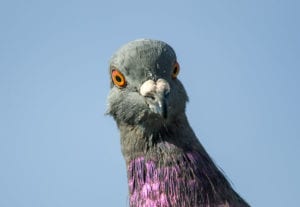
by Pigeon Patrol | Feb 26, 2020 | 4-S Gel Bird repellent, Animal Deterrent Products, Bird Spike, Pigeon Control, Pigeon Droppings, Pigeons in the News, UltraSonic Bird Control
Zombie pigeon epidemic sparks fears of transmission to humans
An “epidemic” of pigeon deaths in Moscow has sparked speculation that birds were succumbing to a virus dangerous to human beings. People who came across sick birds paying no attention to cars or passersby described them as “zombie pigeons.”
On Wednesday the Federal Veterinary and Phytosanitary Inspection Service reported that the birds’ abnormal behavior was caused by the so-called “Newcastle disease,” which can spread to humans.
Moscow’s Veterinary Committee said the mass death of pigeons in the capital was due to salmonellа poisoning, an intestinal infection spread among animals and humans. Veterinary specialists detected lesions on the gastrointestinal tracts and livers of the dead birds caused by salmonella, not Newcastle disease, Interfax reported.
Autopsies of dead birds showed that they had all suffered from a common intestinal infection that is not dangerous to humans, said Moscow’s deputy mayor for social issues, Leonid Pechatnikov. Neither the bird flu, dangerous to humans, nor fowl plague or any other diseases threatening people have been found, he said.
Gennady Onishchenko, Russia’s chief sanitary inspector, said that while the word “pigeon epidemic” was often used in the press, he doubted it could described as one. However, he warned that parents should take care if their children could come into contact with sick birds.

“We are especially worried about children’s playgrounds… And if a dead bird is found on the balcony, it must be washed with disinfectant. Doing this, one must be wearing rubber gloves,” Onishchenko said.
Although the birds’ salmonella is not harmful to humans, direct contact with the sick birds should be avoided, veterinarians said.
“The disease poses no risk for humans, provided standard precautions of personal hygiene are observed and direct contact with sick birds is avoided. Activators of avian influenza and psittacosis (an infection that can be transmitted to humans) have not been identified,” the committee said.
Salmonella infections in humans usually resolve in 5-7 days, but a small number of persons with Salmonella develop pain in their joints, irritation of the eyes and painful urination. The so-called Reiter’s syndrome can last for months or years, and can lead to chronic arthritis.
Newcastle disease, which is transmissible to humans, can cause mild conjunctivitis and influenza-like symptoms.
Ornithologists say that the so-called “epidemic” occurs every year, and not only in Moscow. “Most often, it begins in August. This is due to the fact that the breeding season is over, young birds come out with reduced immunity, and they are more susceptible to all infectious diseases,” ornithologist Natalia Anisimova told Russia’s TV Dozhd (Rain).
source
At Pigeon Patrol, we manufacture and offer a variety of bird deterrents, ranging from Ultra-flex Bird Spikes with UV protection, Bird Netting, 4-S Gel and the best Ultrasonic and audible sound devices on the market today.
Contact us at 1- 877– 4– NO-BIRD, (604) 585-9279 or visit our website at www.pigeonpatrol.ca
Bird Gone, Pigeon Gone, Seagull Gone, Pigeon issue, pigeon spikes, 1-877-4NO-BIRD, 4-S Gel, Bird Control, Pigeon Control, bird repellent, Bird Spikes, sonic bird repellent, stainless steel bird spikes, bird spikes Vancouver, Ultra Sonic Bird Control, Bird Netting, Plastic Bird Spikes, Canada bird spike deterrents, Pigeon Pests, B Gone Pigeon, Pigeon Patrol, pest controller, pest control operator, pest control technician, Pigeon Control Products, humane pigeon spikes, pigeon deterrents, pigeon traps, Pigeon repellents, Sound & Laser Deterrents, wildlife control, raccoon, skunk, squirrel deterrent, De-Fence Spikes, Dragons Den, Canada bird spikes, Canada pigeon, pigeon control, pigeon patrol, pigeon. Kill pigeons, crow, starling

 to feed them, whether purposefully or accidentally through litter.
to feed them, whether purposefully or accidentally through litter.




